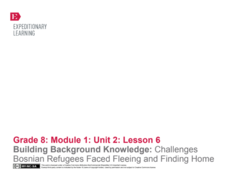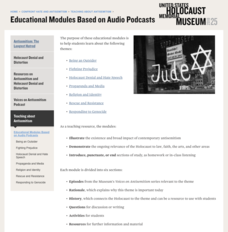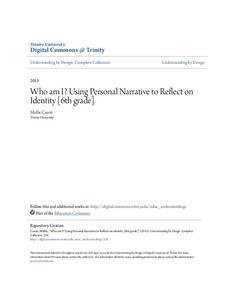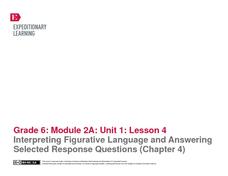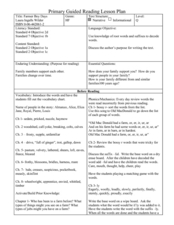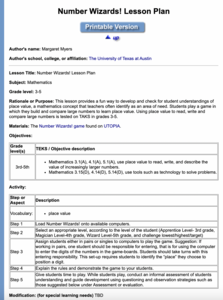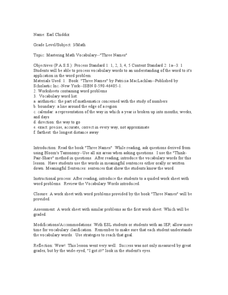EngageNY
Building Background Knowledge: Challenges Bosnian Refugees Faced Fleeing and Finding Home
What challenges did Bosnian refugees face as they fled home during the Bosnian War? Scholars read an interview with four refugees and identify common themes that connect the universal refugee experience. They also engage in a...
Illustrative Mathematics
Many Ways to Do Addition
A great aspect of teaching math is that children have the freedom to solve problems using a variety of different strategies. The focus of this lesson is for young mathematicians to become aware of many ways of answering addition...
Brooklyn Children’s Museum
Volcanoes!
Give young geologists an up close and personal look at volcanoes with a series of hands-on earth science lessons. Whether they are investigating the properties of igneous rocks, building their own volcanoes, or making fudge to model the...
Science Matters
Earthquakes and Volcanoes Post Assessment
The final lesson in the 20-part series is a post assessment covering earthquakes and volcanoes. Twenty-three questions incorporate each of the previous lessons through multiple choice, justified multiple choice, expanded multiple choice,...
US Holocaust Museum
Educational Modules Based on Audio Podcasts
Imagine hearing someone claim an event like the Holocaust never happened. Pupils use audio podcasts and reading passages to dive into the lives of those impacted by the Holocaust of World War II. Using the information they gather, class...
Facebook
Privacy and You
The stuff I share goes where? Social media scholars discover how sites collect and use metadata during a lesson about privacy and reputation. The activity demonstrates smart privacy settings and promotes good digital citizenship.
EngageNY
Analyzing Word Choice: Atticus’s Closing Speech (Chapters 20-21)
Choose your words carefully. Scholars begin by reading a line of Atticus's closing speech in To Kill A Mockingbird. Readers work independently on their note catchers, then complete a Think-Pair-Share activity with partners. They finish...
EngageNY
Identifying Author’s Opinion and Evidence: The Value of Sports in People’s Lives, Part I
Just like instant replay, it's time to take a closer look! Pupils work together to add ideas to a Close Readers Do These Things anchor chart. They then put their knowledge to the test as they read an informational article about the...
Trinity University
Who Am I? Using Personal Narrative to Reflect on Identity
Who am I? Pupils work to answer this question through a unit that explores personal narratives and identity. Exit tickets for activities that examine different poems, short stories, and autobiographical writing serve as prewriting for...
Teaching Tolerance
Community Bulletin Board
A project-based lesson has pupils create a bulletin board to share artwork, nonfiction articles, and messages based on social justice themes. The finished board is displayed in the community to create a place for discussion.
Simon & Schuster
Classroom Activities for Canterbury Tales by Geoffrey Chaucer
Three lessons based on "The Wife of Bath's Prologue" from Geoffrey Chaucer's Canterbury Tales offer scholars an opportunity to examine literary satire, medieval attitudes towards women, and the form and function of a frame story.
EngageNY
Interpreting Figurative Language and Answering Selected Response Questions (Chapter 4)
To prepare for an assessment of how well individuals are progressing with their ability to identify and analyze figurative language and its effect on tone and meaning, pairs work through Chapter Four of Christopher Paul Curtis'...
Curated OER
Geo Jammin' - Day 2, Lesson 6: Rhyme and Reason
Students listen to the poem "Shapes" by Shel Silverstein in order to accurately and specifically describe shapes' rules/traits in their journals. They illustrate the poem and take turns reading during a creative shared reading session.
Curated OER
Farmer Boy Days
Learners complete pre reading, writing, during reading, and interdisciplinary activities for the book Farmer Boy Days. In this reading lesson plan, students complete journal entries, go over vocabulary, answer short answer questions,...
Curated OER
Bible Lesson
Take a creative approach to teaching about community in a religious context. Learners read Acts 2:42-47 and choose the verse they feel exemplify the importance of community. They then pair share, write journal responses, and then...
Curated OER
Shared Birthdays
Students gather information on their classmates birthdays and create a spreadsheet with the dates. Using the internet, they find a famous person who shares their own birthday. They research the life of the famous person and develop a...
Curated OER
The Odyssey Lesson 6
"How are belief systems represented and reproduced through nature?" This essential question guides lesson 6 of this unit on The Odyssey (the rest of the unit is linked). Students first write about a scenario in which they are disguised,...
Curated OER
Lesson Plan for "Little Red Riding Hood"
Grow young performers with storytelling. Elementary schoolers listen to the story "Little Red Riding Hood" by Mike Lockett, highlighting dialogue as they listen, and then act out the story. This is based on a story told by Mike Lockett...
Curated OER
We Love to Read Bulletin Board
Young artists create a bulletin board based on books they have read. They complete a book report and share the information with the class, and use different types of technology to help finish the board.
Curated OER
Ray Bradbury Short Stories - Independent Reading Activity
A straightforward activity about the themes in Ray Bradbury's short stories, this activity allows learners to first work independently and then share their analyses with the class. They read "The Other Foot" as well as another story from...
Curated OER
Number Wizards! Lesson Plan
Students play a game in which they build and compare large numbers to learn place value. They use place value to read, write and compare large numbers.
Curated OER
Connotation: Three Lessons for Effective Word Choice
Over the course of three days, middle schoolers explore the concept of connotation. They differentiate between the connotative and denotative meanings of sports team names, develop their own team names, logos, and text, and revise a news...
Curated OER
Read About Science: Toys
Students complete another Read about Science with a focus on toys. Individually, they read a book of their choice about toys and define new vocabulary. To end the science lesson, they complete a KWL chart and share what they gathered...
Curated OER
three Names Lesson
After the book Three Names is read aloud, math vocabulary is introduced . Either alone or in groups, learners use the vocabulary words in a meaningful sentence. Then they complete the provided worksheet.


